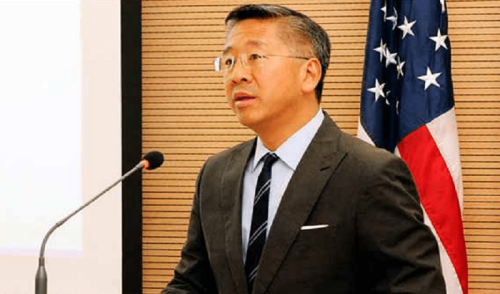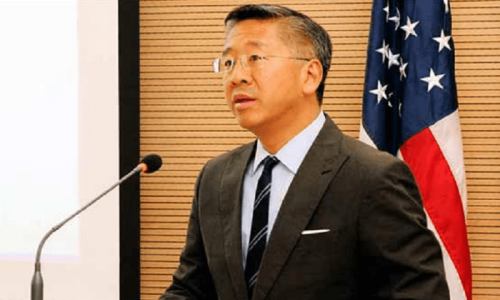US Assistant Secretary of State Donald Lu on Wednesday termed the allegations against him — which formed the crux of the ‘cablegate’ cipher controversy — by former prime minister Imran Khan as a “conspiracy theory, lie and complete falsehood”.
Lu is the diplomat whose supposed warning to former Pakistan Ambassador to the US Asad Majeed was the subject of a cipher sent by the envoy to Islamabad. It was the same document that the PTI founder used to allege a US conspiracy to oust his government in 2022. Imran is currently on trial for mishandling the same confidential document.
This matter is often raised during US State Department news briefings by journalists from both Pakistan and the US. The department consistently refutes these allegations as baseless.
Testifying today before a subcommittee of the US House Committee on Foreign Affairs, at a hearing titled ‘Pakistan After the Elections: Examining the Future of Democracy in Pakistan and the US-Pakistan Relationship’, Lu was questioned about the allegations and his assessment of them.
In response, Lu said: “I want to be very clear on this point. These allegations — this conspiracy theory — is a lie. It is a complete falsehood. I have reviewed the press reporting related to this, what is called the cipher in Pakistan, the alleged leaked diplomatic cable from the embassy here.
“It is not accurate. At no point does it accuse the US government or me personally of taking steps against Imran Khan. And thirdly, the other person in the meeting, the then-ambassador of Pakistan to the US, has testified to his own government that there was no conspiracy.”
During Lu’s response, he was heckled by a person attending the proceedings who called him a “liar” while chants of “Free Imran Khan” were also heard.
Lu said that the US respected Pakistan’s sovereignty and the principle of the Pakistani nation choosing its own leaders through a democratic principle. The conclusion of his response was met by a loud commotion of hecklers against his remarks, who dubbed him a “liar”.
Lu said the allegations against him over the last two years had led to regular death threats against him and his family. “There is a line of acceptability and I think at times, some of the free speech has verged into threats of violence which is not acceptable in our society,” he added.
Meanwhile, another US lawmaker questioned Lu if the United States asked for Imran to be removed from power after his visit to Russia to which Lu responded in the negative.
Lu was also asked about his alleged role in Pakistan’s “regime change” after the PTI government was ousted to which he said: “I was absolutely not involved, nor were any Americans, in that process.”
Disruption of social media platform X
Representative Gabe Amo asked Lu about issues related to press freedom and access to social media platforms to which the latter responded that one of the most “damaging things” witnessed was the restriction on social media.
“When the internet gets pulled down or X gets throttled, as it has been now for several weeks, it denies Pakistanis from getting the kind of diversity of reporting information that they deserve. We are talking to the Pakistani government at the highest levels about these issues.”
Treatment of May 9 protesters and Imran Khan in jail
Meanwhile, Representative Brad Sherman questioned Lu about “hundreds of” American citizens who he said were placed on the Exit Control List and could not leave Pakistan. He asked Lu what the US was doing to get them out when they were not even charged with crimes.
Lu responded by saying there were laws in place but the US was pursuing the matter before Sherman cut him off, saying: “We allow top generals in Pakistan to visit the US when American citizens can’t leave Pakistan and come to the US. We then have the vote tabulation system and they banned the ‘bat’, the symbol of the PTI, and they banned the batsman (Imran Khan). There have been flaws in the Pakistani elections but this is perhaps the greatest flaw.”
Sherman said Pakistan’s ambassadors chalked up the matter as the “ordinary working of the Pakistani judicial system” and asked Lu if the US had faith that Imran “has not been the victim of selective prosecution or is it apparent that he has been?”
In turn, Lu said that the US had raised its concerns about the mass detentions, including of PTI members, after the May 9 riots and the use of military courts. He was subsequently interrupted by Sherman who said: “There is one thing you need to do. The US ambassador needs to visit Imran Khan in prison and make sure that he lives to tell the tale of how he was wrongfully imprisoned through selective prosecution.”
Pakistan’s elections and fraud investigation
In his address to the Congress hearing, Lu reiterated the US State Department’s observations regarding the general elections and elaborated on them.
“We were particularly concerned about electoral abuses and violence that happened in the weeks leading up to the polls,” he said, pointing to the attacks on police, politicians and political gatherings by terrorist groups; harassment and abuse of journalists, particularly female journalists, by political party supporters and lastly, “several political leaders were disadvantaged by the inability to register specific candidates and political parties.”
He said that election monitors said on polling day that they were barred from observing vote tabulation in “more than half of the constituencies across the country”.
Lu also said that authorities shut down mobile data services despite a high court order not to interrupt internet services on election day.
Noting the positive aspects of the elections, he said: “Despite the threat of violence, over 60 million Pakistanis voted, including over 21m women. Voters elected 50 per cent more women to Parliament than they had in 2018.
“In addition to record numbers of female candidates, there were also a record number of members of religious and minority groups and young people running for seats in their Parliament.”
Commenting on the results of the polls, he said Pakistanis had choice as a range of political parties won seats with three different parties leading the four provinces.
“More than 5,000 independent election observers were in the field. Their organisations’ conclusion was that the conduct of the elections was largely competitive and orderly while noting some irregularities in the compilation of results.”
Questioned by US Representative Dean Phillips about elaboration on the US State Department’s call for claims of election interference and fraud to be fully investigated, Lu explained that the Election Commission of Pakistan (ECP) was constitutionally responsible for hearing complaints of candidates and political parties about poll irregularities.
“We as a partner of Pakistan have called for that to be done transparently and fully and for those found responsible for irregularities to be held accountable. We can see a process whereby that is happening,” he said, adding that the ECP had formed a high-level committee sifting through thousands of petitions complaining “about the very same things that we have noted in our statement”.
Lu said that the US would be monitoring the above process “very closely” and would encourage the government and the ECP to ensure that it was a transparent one for the public.
Questioned by US Representative Rich McCormick on his trust in Pakistan’s judicial system to adjudicate claims of electoral wrongdoing, Lu began by first addressing protesters during the hearing who chanted calls for Imran’s release.
Answering the question, Lu said the ECP had previously conducted elections again in cases of electoral abuse and pointed to repolling in some constituencies for the current polls where there was violence.
“We call on the ECP to fulfil its constitutional role in Pakistan to be the watchdog over these elections and to act in a nonpartisan way. We all will be watching this process very closely. As to whether they will do it, it is up to the Pakistani people to make sure their institutions are functional and upholding the Constitution.”
Meanwhile, another US lawmaker questioned Lu on whether the US State Department had conducted its own investigation of the general elections to which the latter responded in the affirmative and said certain actions were also being taken such as monitoring of the process to address poll irregularities.
To this, the US lawmaker said: “This country needs to start using its economic might to correct some of these wrongs. These people are being mistreated.”
US partnership with Pakistan against terrorism
Questioned on the ability of Pakistan’s government to prove to be and continue to be a good partner for the US in the region, Lu said the country was a very “important partner” and a major non-Nato ally.
“We have deep national security interest with Pakistan, not the least of which is the fight against terrorism. Not only terrorism that affects Pakistanis but terrorism that affects Americans. Pakistan has been a partner in our resettling of Afghan refugees to who we owe a debt and we are grateful to the people and government of Pakistan for that cooperation.”
However, Lu did say that the US administration viewed Pakistan’s current relationship with the Afghan Taliban with “suspicion”.
He said the current greatest terrorist threat to Pakistan emanated from Afghanistan, adding that the Taliban’s relationship with the neighbour was the same as their relationship with the US. “Very strained and difficult,” he added.
Lu said the US had a “very important dialogue” with Pakistan on shaping the Taliban’s behaviour and making sure that they upheld their commitments.
Indian plot to kill Sikh separatist in US
Lu was also questioned about any sanctions following an investigation into an alleged Indian attempt to assassinate a Sikh dissident on American soil to which he said: “This is a serious issue between the US and India.”
He said the US administration took the issue “very seriously” and had raised it at the highest levels with India.
Lu also said the US was working with India and encouraging it to hold accountable those who were responsible for the “terrible crime” and pointed to India’s announcement of creating an inquiry committee on the matter.
“We ask them to work quickly and transparently to make sure that justice is done,” he said.















































Dear visitor, the comments section is undergoing an overhaul and will return soon.